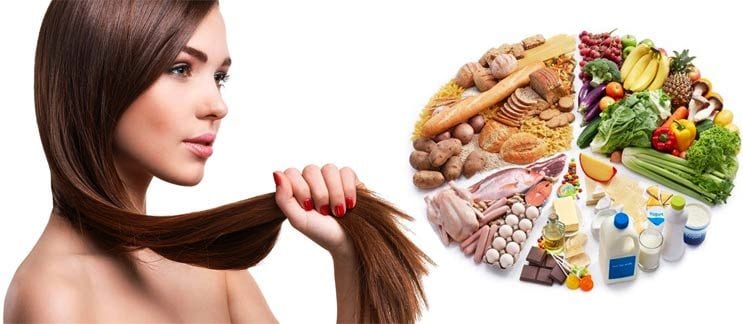Contents
Hair is a horny derivative of human skin. They have a protective and aesthetic function. Hair protects the human head from hypothermia and mechanical damage. In addition, healthy, beautiful and well-groomed, they make a person more attractive in communication with other people. Hair lives from 2 to 4 years, grows by 12 cm per year and up to 8 m throughout life. Their total number on the head ranges from 90 to 150 thousand.
For hair to always remain healthy and strong, it is necessary to provide it with adequate nutrition, with enough protein, healthy fats, unrefined carbohydrates and vitamins, trace elements, as well as amino acids.
- Proteins… It is better to give preference to lean meats, fish, eggs, nuts.
- Healthy fats… It is necessary to eat foods rich in unsaturated fatty acids. For example, fatty fish, any non-fried vegetable oils (olive, corn, sunflower, linseed), nuts, seeds.
- Unrefined carbohydrates… Contained in vegetables and fruits, in products made from second grade flour, bran. Cakes, sprouted wheat grains are very useful.
Vitamins for hair:
- B vitamins… Promote rapid hair growth, make them strong and thick, reduce oiliness, give elasticity and shine (cereals, grains, nuts, eggs, brewer’s yeast).
- Vitamin E… Nourishes hair follicles, heals hair, protects against ultraviolet rays, restores scalp blood circulation (nuts, seeds, vegetable oils, green leafy vegetables, eggs).
- Vitamin A… Improves the structure of the hair, making it soft and silky. Of particular benefit will be dry and split hair (liver, eggs, butter, cottage cheese. Good sources of carotene: carrots, sea buckthorn and apricots).
- Vitamin C – activates blood circulation, accelerates hair growth, promotes the absorption of iron (citrus fruits, Japanese quince, rose hips, sea buckthorn, currants, kiwi).
Trace elements:
- Magnesium – gives elasticity to hair. Contained in fresh herbs, nuts, dried apricots.
- Silicon – makes hair strong and durable (cucumbers, zucchini, roots);
- Zinc – prevents the appearance of gray hair and hair loss (garlic, onions, cabbage);
- Selenium – protects against ultraviolet radiation and other harmful effects (meat, milk, rye bread);
- Phosphorus – provides hair with rich color and elasticity (fish, beans);
- Calcium – necessary for the structure of hair (dairy products, herbs, dark green vegetables.)
- Iron – strengthens hair, prevents early gray hair (liver, buckwheat, pomegranate);
- Sulfur – provides strength and shine (fish, liver, garlic, legumes);
- Iodine – gives hair a healthy look, participates in metabolic processes (seafood, persimmons, mushrooms);
- Copper – protects hair from premature aging (buckwheat, oatmeal, pearl barley, apricots, pumpkin);
- Amino acid tyrosine it is also necessary for hair, protecting it from early gray hair.
Top 10. Most Useful Hair Products
Fish and Seafood – Rich in phosphorus, zinc, iodine and healthy fats.
Greens and leafy vegetables contain a lot of calcium, magnesium, iron, vitamins C, A.
Nuts and seeds are a valuable source of vitamin E and polyunsaturated fatty acids, they contain zinc and selenium.
Cereals (sprouted grains, cereals, crisps, bran) are the main source of B vitamins
Poultry – contains an easy-to-digest protein, without which hair becomes dull and discolored. In addition, poultry meat is rich in iron, which is essential for the body.
Eggs are a source of protein. In addition, they contain B vitamins, which are essential for the body.
Vegetable oils contain polyunsaturated acids and vitamins A, D, E.
Vegetables (carrots, beets) – rich in B vitamins, vitamin A, as well as magnesium and potassium.
Dairy products are sources of organic calcium, which is responsible for hair growth and strengthening.
Legumes are rich in iron, zinc and biotin, which are responsible for the strength of the hair.
Folk remedies for hair treatment
In some cases, nutrition alone is not enough to keep your hair healthy. In this case, natural remedies will help.
For active growth and beauty of hair, Dr. Walker advises taking 0,5 liters of juice from carrots, lettuce and alfalfa every day for a month.
How to prepare: Mix 9 parts freshly squeezed carrot juice with 3 parts lettuce juice and add XNUMX parts alfalfa juice to this shake.
If you fail to make such a composition – it does not matter! It can be replaced with a simpler cocktail. Carrot and cucumber juice will help restore hair to its strength and shine, and accelerate growth. The juice is taken in a 1: 1 ratio.
In case of severe hair loss, herbalist Rim Akhmetov advises using this recipe: pour 2 cups of oats with 6 cups of boiling milk. Boil for 2 minutes over low heat and cool. Take 3 glass 1 times a day for a month. After a month, repeat the course.
The table below summarizes the causes of some hair problems.
Products harmful to hair
- Sugar – in large quantities, it acts in the human blood as a toxic substance that is secreted through the skin (including through the scalp), and makes it oily.
- Salt, consumed in large quantities, interferes with the absorption of vitamins.
- Carbonated drinks are high in unhealthy ingredients and empty carbs.
- Convenience foods and fast food. In these products, there are almost no vitamins and microelements that are useful for the human body and, accordingly, for the hair.
- Products containing caffeine (coffee, tea, chocolate). It prevents the absorption of vitamins such as B and C, which are important for hair, as well as zinc and potassium.
- Fatty dairy products. May cause allergies and itchy scalp.
We have collected the most important points about proper nutrition for hair in this illustration and we will be grateful if you share the picture on a social network or blog, with a link to this page:










